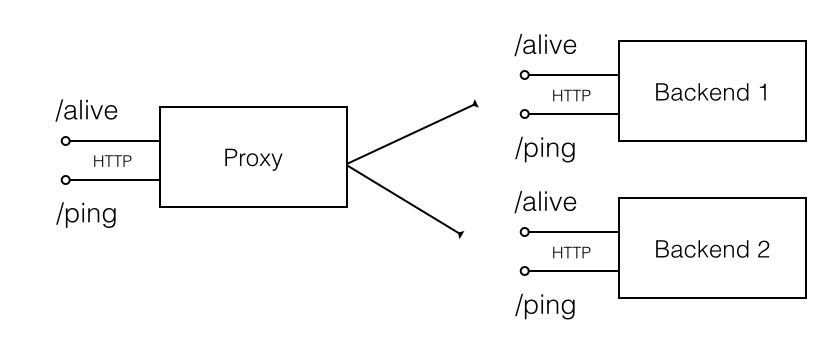This is an interview task we use for exploring the programming capabilities. Please design and implement a simple HTTP proxy regarding to the following requirements.
- The proxy is supposed to listening on
localhostand the port8080. - There are two identical backends represented by HTTP servers
- Backend 1 listens on
localhostand the port8081 - Backend 2 listens on
localhostand the port8082 - A backend server handles two resource on on the URI
/aliveand/ping - a GET HTTP request on the path
/alivereturns a JSON document{"backend":{"id": "%ID"}} - a GET HTTP request on the path
/pingreturnspong
The proxy handles a GET HTTP request on /backends by dispatching GET /alive requests to both backends, merges their responses and returns a JSON document with the following structure
{
"backends":[
{
"backend":{
"id":"%ID"
}
},
{
"backend":{
"id":"%ID"
}
}
]
}
The proxy handles a GET HTTP request on the path /ping by dispatching the request to one of the backends and returning its response. A HTTP proxy client may choose the preferred backend via the HTTP header X-Backend-id:%ID.
- A backend might be temporary unavailable and immediately respond with HTTP status 503. When a backend returns 503 the proxy will dispatch the request to another backend.
- A backend might be slowed down and respond after a while. When a backend doesn't respond in 5 seconds the proxy will dispatch the request to another backend. When both backends do not respond the proxy will respond by HTTP status 503.
Please fork this GitHub repository and send a pull request once the acceptance test com.gooddata.interviewtask.httpproxy.AcceptanceTest passed (mvn test). The test starts mocked HTTP servers simulating behaviour of the real backends. It's highly recommended to use the test while you develop the proxy. Feel free to use your favourite Java server technology, MVC framework or HTTP client.
